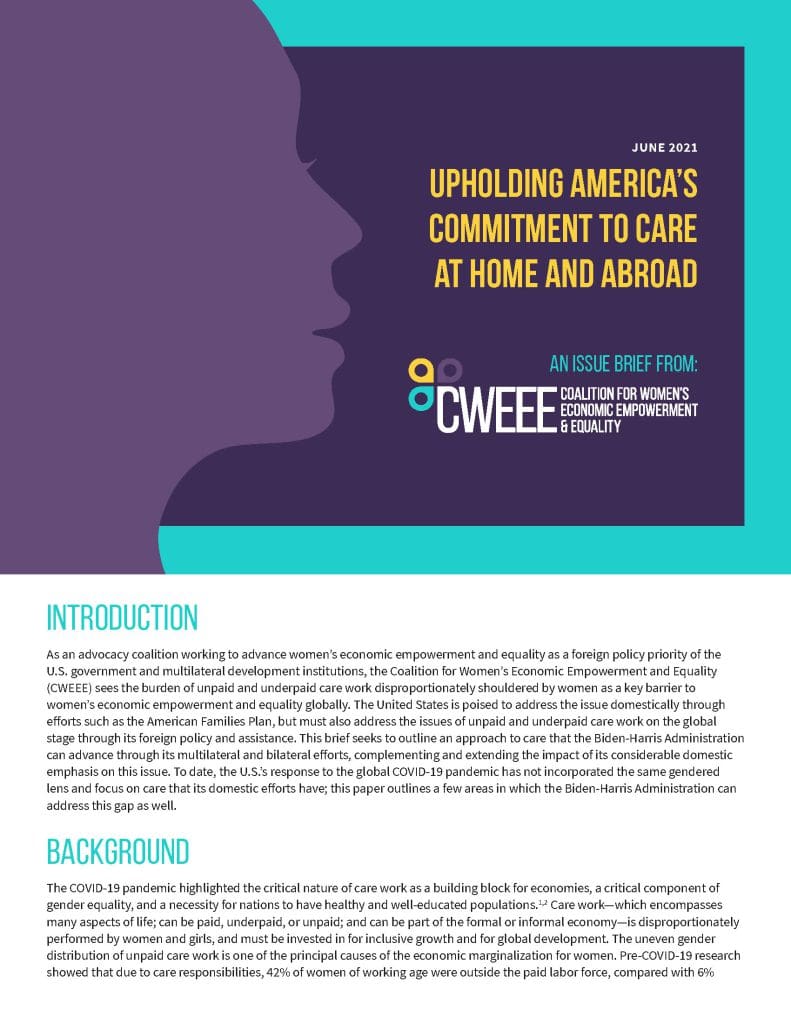
Upholding America’s Commitment to Care at Home and Abroad
 As an advocacy coalition working to advance women’s economic empowerment and equality as a foreign policy priority of the U.S. government and multilateral development institutions, the Coalition for Women’s Economic Empowerment and Equality (CWEEE) sees the burden of unpaid and underpaid care work disproportionately shouldered by women as a key barrier to women’s economic empowerment and equality globally.
As an advocacy coalition working to advance women’s economic empowerment and equality as a foreign policy priority of the U.S. government and multilateral development institutions, the Coalition for Women’s Economic Empowerment and Equality (CWEEE) sees the burden of unpaid and underpaid care work disproportionately shouldered by women as a key barrier to women’s economic empowerment and equality globally.
The United States is poised to address the issue domestically through efforts such as the American Families Plan, but must also address the issues of unpaid and underpaid care work on the global stage through its foreign policy and assistance. This brief seeks to outline an approach to care that the Biden-Harris Administration can advance through its multilateral and bilateral efforts, complementing and extending the impact of its considerable domestic emphasis on this issue. To date, the U.S.’s response to the global COVID-19 pandemic has not incorporated the same gendered lens and focus on care that its domestic efforts have; this paper outlines a few areas in which the Biden-Harris Administration can address this gap as well.
Key Recommendations
To address the care burdens that have been highlighted and increased as a result of the COVID-19 pandemic, the U.S. must include key care considerations in all of its foreign assistance. This includes as part of its COVID-19 response and recovery, development and humanitarian aid, climate finance, development finance, and multilateral engagement. Below is a collection of commitments and key actions the U.S. can take to build care into foreign assistance.
- Increase the Financial Investment in Care across all Foreign Assistance: The increase in investments in care projects should be done across all foreign assistance tools, including via integrating care considerations and assessing the impacts of investments and aid on care, and be reported on transparently. More specifically:
-
- Invest an additional 2% of Official Development Assistance (ODA) in principal gender equality funding for care work that includes stand-alone programming for care.
- Ensure Climate Finance is gender-responsive and invests in climate change-resilient infrastructure, such as transportation, housing, electricity, sanitation, and piped water, to reduce unpaid care work and mitigate the impacts of climate-change on increasing care work for women and girls.
- Increase stand-alone investments in care projects at the Development Finance Corporation by 2%, and build care components into non-care focused projects, including as part of labor rights considerations within deals and environmental and social risk mitigation plans
-
- Incorporate Care Considerations as part of Labor Rights: As part of cross cutting efforts to support care around the world, all U.S’s foreign assistance tools should incorporate care-specific challenges throughout all agencies and foreign assistance mechanisms labor standards, including Environmental and Social Standards. This should include protections for domestic workers, migrants, and workers in the informal economy. Additionally, all foreign assistance efforts should:
-
- Implement and internationally advocate for implementation of ILO Convention C189, which protects the rights of domestic workers, and ILO Convention C190, which protects workers against violence and harassment, including gender-based violence and harassment.
- Support unionization efforts, formalization, and labor organizing for domestic and care workers.
-
- Integrate Care in U.S. COVID-19 Response and Recovery: It is critical that care infrastructure is incorporated into the U.S.’s global COVID-19 response and long-term recovery plans, including investing funds in care infrastructure, and that all COVID-19 response and recovery foreign assistance incorporate findings from gender analyses to support these efforts. This should include:
-
- U.S. funded efforts and new investment required to support equitable vaccine delivery must ensure frontline health workers, including community health workers—70 percent of whom are women—are all paid in line with WHO guidelines. Women health workers contribute $3 trillion annually to the global economy, but half of this work is unpaid and unrecognized.
- Ensuring women, especially women frontline health workers, are meaningfully included in leadership roles and shape vaccine roll out, policies and programs at all levels.
- Advocating against austerity measures within global financial bodies, and instead pushing for adequate financing for public provision of social safety net provisions and investment in care infrastructure as the most economically sustainable approach to building back from COVID-19.
-
- Care and Multilateral Engagement: U.S. participation and leadership in global spaces focused on care has the potential to encourage increased engagement by others globally and is critical to ensure cohesion with global efforts. U.S. leadership in multilateral spaces in advocating for policies to support care where it is not currently on the agenda is critical to advancing the widespread goals and benefits of investments in care. As initial steps supporting care in multilateral spaces the U.S. should:
-
- Join the Global Alliance for Care started by the government of Mexico’s National Institute for Women (INMUJERES) in partnership with UN Women to support global evidence collection, informed policy, and advocacy around both unpaid and paid care at a global level.
- Advocate for care as an essential and cross-cutting component in IDA20 negotiations, including policy commitments on investments in care infrastructure and care-services; recognizing, reducing, and redistributing unpaid care; supporting social protection of workers in the care-sector; and engaging care workers in stakeholder consultations.
-
